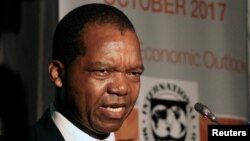Economic growth among countries in sub-Saharan Africa is expected to rebound this year from 20-year lows in 2016, according to the International Monetary Fund's biannual report. But despite the modest recovery, the Washington-based organization warns public debt is rising and soon could become unsustainable in some African countries.
After a slowdown in 2016 where the sub-Saharan regional economy grew by just 1.4 percent, the IMF said growth is expected to almost double this year to 2.6 percent, and to reach 3.4 percent in 2018.
One-third of sub-Saharan economies are growing at more than 5 percent. Speaking at a news conference in Harare this week, the IMF's Africa Department Director Abebe Aemro Selassie said he doesn't expect others to catch up.
"We're still going to have a situation where 12 out of the 45 countries in sub-Saharan Africa, people in those countries will not be enjoying any increase in per capita income," Aemro said. "This is about 40 percent of the population. So a lot of work to be done to put in place the policies, policy environments, to get growth back up to the 5 or 6 percent we need to make a significant dent on poverty reduction going forward."
Some bright spots
Not all economists agree with the IMF forecasts. Too pessimistic, said Judith Tyson of the Overseas Development Institute.
"They haven't really looked at the impact of the recent increases in commodity prices, and in particular, oil has moved up well over $60 a barrel in recent weeks," he noted. "And there's quite a lot of optimism that it will remain at that level. And the IMF have forecast only $50."
That's a big deal for countries like Nigeria and Angola economies largely dependent on the oil sector. Tyson said it's not only the price of oil that is underestimated.
"For some of the specialist metals, particularly around the electric car market this year, there's been a lot of speculation," he said. "And those are produced in large quantities in a large number of African countries, and they haven't really looked at examples of that. So for example, cobalt is a major metal that is mined in Zambia and the DRC."
The IMF also flagged growing concerns over public debt now above 50 percent of GDP in half of sub-Saharan economies, just as the costs of debt servicing are rising.




